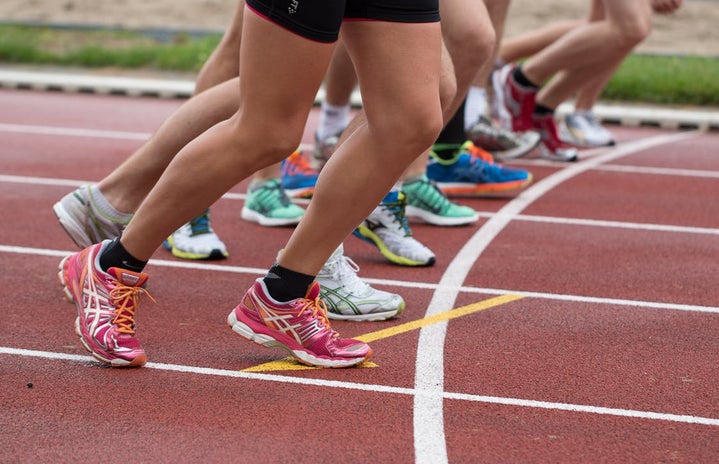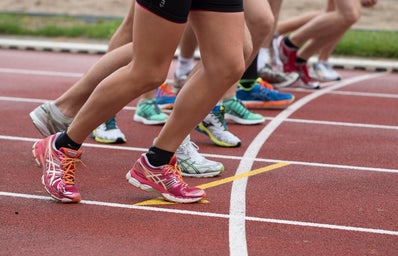The University of Nottingham has an exciting, new women in sport podcast. Like a Green and Gold Girl was launched to inspire women of all ages to participate in sports, whilst crushing the negative stereotypes that surround the idea of playing sport ‘like a girl’. In each episode, I chat with some of the University of Nottingham’s top female athletes from a range of sports to learn about their unique experiences, including the highs and the lows that come with competing at such a high level.
To date, the podcast guests have included an Olympic table tennis player, a member of the National Karate squad, an Irish international badminton player, and two synchronised swimmers. I have compiled the finest tips and recommendations from these elite female athletes to share with you. Whether you’re an aspiring elite athlete or just a girl passionate about exercise, keep reading to learn the best ways to cope with the challenges and pressures associated with competitive sports.
Dealing with injuries or illness
Every athlete (or human) has experienced it – when you push your body a bit too hard, it just says ‘nope’. As an elite athlete especially, injuries are bound to happen at one stage or another – but how you deal with them and subsequently recover can determine your ability to get back into competing.
- Be patient and focus on each day as it comes. Injuries and illnesses are incredibly frustrating, especially mid-season! You never know exactly how long your body needs to heal. Treating each day with a fresh mind can help give you a more positive outlook on the recovery process.
2. Take the opportunity to rest!
If you are getting frequently unwell or injured, your body might be trying to tell you something! Make sure you take time to listen to your body and cut it some slack.
3. Make your body stronger in the long term.
Injury-wise, use your usual training hours to focus on rehab exercises to make your body even stronger than before. This can help prevent the occurrence of injuring the same area in the future.
Dealing with pressure
High-scale sports competitions can seem daunting and the pressure on some athletes can feel debilitating at times. From some of the highest-ranked female athletes in the UK, here is their advice on using pressure to your advantage:
1. Ground yourself before the event.
Give yourself some time to focus and somewhat relax before your event, whether it’s through spending some time by yourself, listening to music, or chatting with your friends or coach. It will take some time and experimentation to find what works for you.
2. Try to view each match or event as the same.
Your physical body is highly responsive to your thoughts. If you try to psychologically trick your brain into thinking this is just a normal match, you will be able to physically relax more, allowing you to focus on the game at hand.
3. Feel gratitude that you can compete at these events.
As tennis legend Billie Jean King contends, “Pressure is a privilege”. Feel pride and appreciation that you have had the opportunity to make it to this stage in your sporting career. Your younger self would’ve only dreamt of this moment!
Dealing with failure in sport
Every sport is a game. In a game, you will sometimes lose. Failing, overcoming failure, and learning from it, are incredibly important if you want to succeed in your sport. This advice is from an elite athlete who had a huge set-back in her sporting career:
1.Take time out to re-evaluate and reflect.
Sometimes you will fall out of love with your sport. Sometimes you will push yourself so hard that you lose the raw enjoyment of playing. When this happens, taking a step back to recalibrate and reflect can be super healthy.
2. Focus on things outside of your sport for a while.
Although fitness gurus will repeatedly tell you not to quit, becoming incredibly narrow-minded about your sport can lead to a lack of enjoyment and a downward spiral. Sometimes, opening your mind and taking a break to participate in activities outside of your sport can be helpful. You will probably start to miss your sport, and if you don’t, then maybe that’s a sign…
3.Play with friends and family to find your enjoyment again.
After taking some time out, playing your sport for fun with your loved ones can help you realise the fun aspect of your sport again. This can help replenish your enjoyment of the sport and remind you why you started playing it in the first place!
Dealing with body image
Research from Women in Sport recently found that during puberty, many young girls participate less in sports due to developing a negative relationship with their changing bodies. As they begin to transition into adulthood, evidence conveys that many girls experience a lack of self-confidence and feel like they are being watched, which often leads to them withdrawing from exercise. Negative body image is unfortunately a common experience for many women of all ages. Here are some words of wisdom on body image from my guests:
1.You don’t need to have an ‘ideal’ physique to be good at sport.
Everyone comes in different shapes and sizes – this includes professional athletes! Some people can have incredible fitness or be super strong, yet not look like your ‘average’ athlete. Try not to compare your body to others, but also try not to judge other people’s bodies – you have no idea of their true capabilities!
2. Food is fuel.
With all the constant pressures forced upon us by social media on dieting, achieving #BodyGoals, and looking like skinny models, it is so easy to slip into dangerous eating habits. However, we are all human beings – and we need nutrition to fuel our bodies! In sports, it is especially important to view food as a source of energy and power, both mentally and physically.
3. Appreciate all your body can do.
Exercise to feel strong. Marvel at all the amazing things your body can do! Be grateful that you can participate in sports and exercise.
4.If you are struggling – communicate with people.
Do not suffer in silence. Sometimes a conversation with friends, family or a coach can do you a world of good. You can also seek support from eating disorder charities*.
Balancing academic demands with playing competitive sports
The build-up of university work can sometimes feel super overwhelming – particularly when you have large sporting commitments that take up a lot of your time. However, it is worth remembering that participation in sports at university has been proven to increase academic achievement! Finding a balance between your degree and sports can be a challenge, so take your time in finding what works for you.
1.Get up early.
This depends on your sleeping pattern, but 7/8 am has been recommended as an ideal time to get up. This makes the day longer, allowing you more flexibility to fit in work around your other commitments.
2. Set yourself allocated slots of time to work – little but often.
This tip will only work if you stick to your allocated slots to the best of your ability. Planning your day and giving yourself realistic periods of working time can help you focus and be productive.
3. Prioritise different things at different times.
Depending on your competition schedule or deadlines, you will find that you might have to make some sacrifices in both your sport and your academic work. Being organised and knowing what is coming up can help you prepare. This way you can meet your deadlines whilst still competing in sports events.
Like a Green and Gold Girl podcast is available on Spotify and Apple Podcasts. You can also find us on Instagram @likeagreenandgoldgirl.urn ☺


